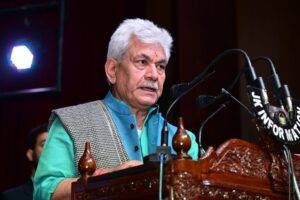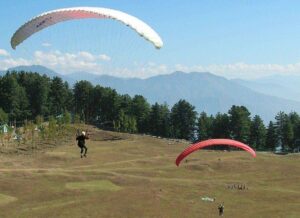Last Updated on July 14, 2020 at 5:49 pm
Nobody could imagine that born in a middle-class family of shawl merchants, Shiekh Abdullah would achieve not only freedom of press and platform, but would achieve for them complete freedom from dynastic rule after four centuries of serfdom.
Sheikh rose like a colossus after a long struggle and sacrifice spending almost half of his political life in different prisons, which won for him the loving title of “Sher-e-Kashmir” and made him a legend in his life-time.
This reminds me of what the English poet Longfellow said in “The ladder of St.Augustine” about the heights achieved by great men:-
“The heights that great men reached and kept, were not attained by sudden flight, but they, while their companions slept, were toiling upward in the night”.
Born on 5th December 1905, Sheikh went to study at a Maktab near his house in village Soura in the outskirts of Srinagar. It was here that he learnt the Holy Quran from Akhoon Mubarak Shah, a sufi who loved his pupils. Sheikh developed an unusual love and talent in recitation of the Quran that in later years when he started his political career he would keep his audience spell bound.
Himself a devout Muslim, Shiekh Abdullah believed that Islam did not teach hatred but respect for other religions. I remember that once when he was lodged in Reasi jail, he wrote a letter to my younger brother, Hari Ram Sharma, asking him to send the Bhagwad Gita and Granth Sahib (preferably in Urdu) as he wanted to study the teachings of these religions. I knew that the only establishment where such books were available was Messers Ali Mohammad & Sons in Maharjgunj. I went there and fortunately found the Gita rendered in beautiful Urdu verse by Khan Bahadur Dil Mohammad “Dil”, retired principal of the Islamia College, Lahore.
I could not get the Holy Granth Sahib in Urdu but got “Sukhmani Sahib” and “Japji Sahib” (both in one volume) rendered in simple verse by the same author.
My brother personally took these books and some other items, like Khadi Kurtas and payjamas and chappal, which Sheikh sahib wanted. As the jailor happened to be our relative, there was no difficulty in his personally meeting Sheikh Sahib. I am narrating this incident because study of the tenets of Hinduism and Sikhism while he was in the Reasi jail made a deep impression on his mind and the future course of his political life.
After passing his F.Sc. examination from the S.P. College, Srinagar, Sheikh Abdullah came to Jammu to seek admission in B.Sc. in the Prince of Wales College (now GGM Science College). This having been denied to him, he went to Lahore and got admission in the Islamic College. Passing B.Sc. examination of the Panjab University, he went to Aligarh and got his M.Sc. degree from the Muslim University, Aligarh.
Returning to Srinagar in 1930, he got a petty post of a teacher but he soon resigned and began his political career. In this article, I propose mention of only a few achievements which marked him out as one of the outstanding freedom fighters of India.
The National Conference
The conversion of the Jammu and Kashmir Muslim Conference into National Conference in 1939 was, to my mind, a most daring and revolutionary step in the politics of Kashmir.
Sheikh Abdullah was influenced by Dr. Sir Mohammad Iqbal, who in 1937 had advised Sheikh that only “unity could deliver Kashmir from the present turmoil”. He was also influenced by Gandhi ji, Pandit Jawahar Lal Nehru and Khan Abdul Gaffar Khan to broadbase the movement in Kashmir if he wanted support from the Congress.
Shiekh Abdullah’s action embittered Jinnah who was adamant on keeping politics apart from religion. He personally went to Srinagar but the Sheikh rejected the two-nation theory outrightly and incurred displeasure of Jinnah.
New Kashmir Plan
After making several abortive attempts to achieve a responsible government under the aegis of the Maharaja, Sheikh Abdullah in 1944 published his famous “New Kashmir” plan containing draft of a Constitution and outline economic plan for the state, as the ultimate goal to be achieved by the National Conference.
Pakistan’s Enemy Number 1
Pakistan declared sheikh Abdullah as its enemy number 1 and his head carried an award of Rs. one lakh.
Undaunted, however, Shiekh Abdullah declared:-
“Pakistan considers me its enemy number 1, because I am prepared to sacrifice my life for service of all irrespective of caste, creed and colour”.
Jinnah was bent upon taking revenge and a treacherous plot to implicate Sheikh Abdullah was planned. This was revealed by Mr. GK Reddy, former director of public relations of the so-called “Azad Kashmir government” in an exclusive interview published in the Blitz of Bombay on June 9,1948.
“To begin with, Jinnah tried to create a rift between the Kashmir Maharaja and the Indian Union and thus prevent its accession to India. To facilitate this process, he instructed the Muslim Conference to carry on virulent propaganda in favour of independence…. At this time Jinnah’s plan was to create a “second front” against the union government by propping up a number of princes as independence monarchs. In treaty relations with Pakistan. He thought that this policy alone would help Hyderabad. But when all these machinations failed and almost all princes rallied around the Indian union with Hyderabad in a precarious position with Kak dismissed and sheikh released, Jinnah felt that if he continued to keep quiet, Kashmir also may be lost. So, Sheikh Sadiq Hussain was sent to Srinagar with instructions that the Muslim Conference should revise its stand and carry on virulent propaganda in favour of the state’s accession to Pakistan. A number of Muslim League leaders were sent to Srinagar to assist the Muslim conference in this task. A large number of officials and non-officials came to Kashmir from the NWFP with the definite object of creating communal trouble”.
Reddy gives further details of Pakistan’s trap for Sheikh Abdullah by offering special safeguards to Kashmir if Sheikh agrees to press for the demand for the state’s accession to Pakistan….. If Sheikh Abdullah agreed to these terms, the modus operandi to secure the accession of the state was as follows:- “Sheikh will make a public announcement that in view of the geographical position and communal composition, Kashmir must accede to Pakistan. If the Maharaja refuses to accept the advice, there will be simultaneous uprising in various parts of the state with the help of arms and ammunition supplied by Pakistan. Before the uprising, Sheikh Abdullah and his colleagues should cross over into Pakistan and form a provincial government under Sheikh Abdullah’s presidentship”.
Reddy asserts that Jinnah firmly believed that sheikh Abdullah would not fall into his trap. But the plan was that on arrival Sheikh Abdullah should be given a rousing reception in Pakistan. “If he fell a victim to the League leaders hypnotism well and good, Otherwise, on the D-Day for the invasionto Kashmir was fixed two days after Sheikh Abdullah’s meeting with Jinnah in Karachi which the Pakistani premier was trying to arrange. The plan was that if the Sheikh proved intransigent and did not fall prey to the blackmail, he would be secretly arrested and removed to an unknown destination and a provisional government under his presidentship announced and proclamations issued in his name he would be rotting in some jail. And when the tribal hoarders were ransacking Kashmir, the poor Kashmiris would be thinking that Sheikh Abdullah had sent them”. Sheikh Abdullah however did not fall into the trap.
Jammu and Kashmir’s accession to India
One of historic contributions made by Sheikh Abdullah was his decision to outrightly reject Jinnah’s two nation theory and to lead the Muslim majority state of Jammu and Kashmir to accede to secular India.
Refering to this contribution, the then President of India, R. Venkataraman, paid tribute to sheikh Abdullah’s services and sacrifices at a civic reception accorded to him in Srinagar on 27th September, 1987 in the following words:-
“In recent times your heroes of the freedom struggle were the heroes of the entire nation. Who does not remember the Sher-i-Kashmir, the immortal Sheikh Abdullah whose services and sacrifices united this part of the country in eternal bonds of friendship and affection with the left-over British India”. Sheikh Abdullah, he added, was very fond of the poetry of Iqbal and often quoted one line of Iqbal: “ Uttho meri dunya ke Garibon ko jaga do”.
“Nothing should be allowed to deflect us from that endeavour to bring our masses to life of fruitful and self-fulfilling activity. In this great endeavour, this state’s example of three distinct socio-cultural modes living together if of great value, Jammu, Kashmir valley and Ladakh, form in fact a tripod of secularism. This state provides an object lesson very difficult to find elsewhere, the lesson of human brotherhood that transcends divisions of creed and language and invests us with Indianness”.
Revolutionary Land Reforms
The revolutionary land reforms announced by Sheikh Abdullah in July 1950 brought him both bouquets and brickbats. A month before he actually made this announcement, he had sent two proposal to the Regent, Dr. Karan Singh, for signature. The two proposals envisaged abolition of Jagirdari system and abolition of land-lordism without payment of any compensation.
Karan Singh says, “I was in broad sympathy with the measures proposed, but obviously they would adversely affect large sections of people, particularly non-Muslim population of the state”.
He referred the matter to Vishnu Sahay, then secretary for Kashmir affairs, Government of India.
On receipt of a reminder from Sheikh Abdullah, the Regent informed him of the action taken by him. This infuriated Sheikh Abdullah who in a memorandum reminded the Regent that according to the Maharaja’s proclamation dated 5th March 1948, the Regent was only the constitutional head of the state. The Sheikh questioned the very jurisdiction of the Government of India in the matter. He said only three subjects had been transferred to the union government under the Instrument of Accession.
On July 12, the Regent having received a draft reply duly approved by the union government sent the following reply to Sheikh Abdullah;-
“I appreciate the constitutional position under the proclamation of March 5, 1948. None the less it seems to me that these very far reaching proposals which will drastically affect the economy of very large section of population and for the sanctioning of which there is no properly functioning legislature at present, should, in the existing delicate political situation, be first examined in concert with the government of India, and that we should not rush this legislation without satisfying the government. I would ask the ministry to consider this aspect of matter”.
Sheikh Abdullah had also been called to Delhi to discuss implications of the proposal but he was so much committed to his vision of land to the tiller that he brushed aside the advice of the union government and made a public announcement of the land reforms the very next day- 13th July 1948.
This was the first of the series of differences of approach and opinion between him and the government of India that grew over the next few years and culminated in the dramatic events of August 1953, says the Regent in his autobiography entitled “Heir Apparent”.
Kashmir Leads India
The greatest tribute paid to Sheikh Abdullah for the pattern of land reforms introduced by him was from Elmore Philpott, correspondent of the Vancouver Sun of Canada who came to Kashmir in 1951. In his article “Kashmir leads India”, he said, “One reason why I was anxious to visit Kashmir was that everywhere I went in Southern India the state governments envied Kashmir advanced land reforms programme”.
“The chief minister of one key state menaced by Communist violence told me that if he had the legal powers to do what Kashmir had already done, his main worries would be over”.
“In India many wise men ask, can a democracy deliver the results in time, or will India too go the way of Russia and China”. “In Kashmir under what is clearly the most progressive administration in all India, the resolute government of Sheikh Abdullah has already enacted a model and drastic land reforms”.
End of Dynastic Rule
The state constituent assembly on 20th August 1952 passed a resolution terminating the hereditary rule in the state. Nobody could imagine at that time that the rulers of other Indian states who had acceded to India will go the same way, though by adopting a different method. Mrs. Indira Gandhi even stopped payment of privy purse guaranteed to them under the agreement.
Raising of Kashmir Militia
The last historic act worth mention is raising the Kashmir National Militia. Not only the Kashmiri Muslims but even Pandits and Sikhs were not recruited in the state army as Kashmiri was considered a non-martial race. To Sheikh Abdullah goes the credit of throwing open recruitment of Kashmiris in the armed forces of India. He made a beginning by raising the Kashmir National Militia in face of bitter opposition. Not only men but the Kashmiri women were also armed and given proper training. Mention may be made of Zainab Begum and Mehmooda Ahmad Ali who were foremost among women to undergo military training.
The article has been taken from the archives of veteran journalist Late Shri B.P. Sharma.
The article is a copyright material.



